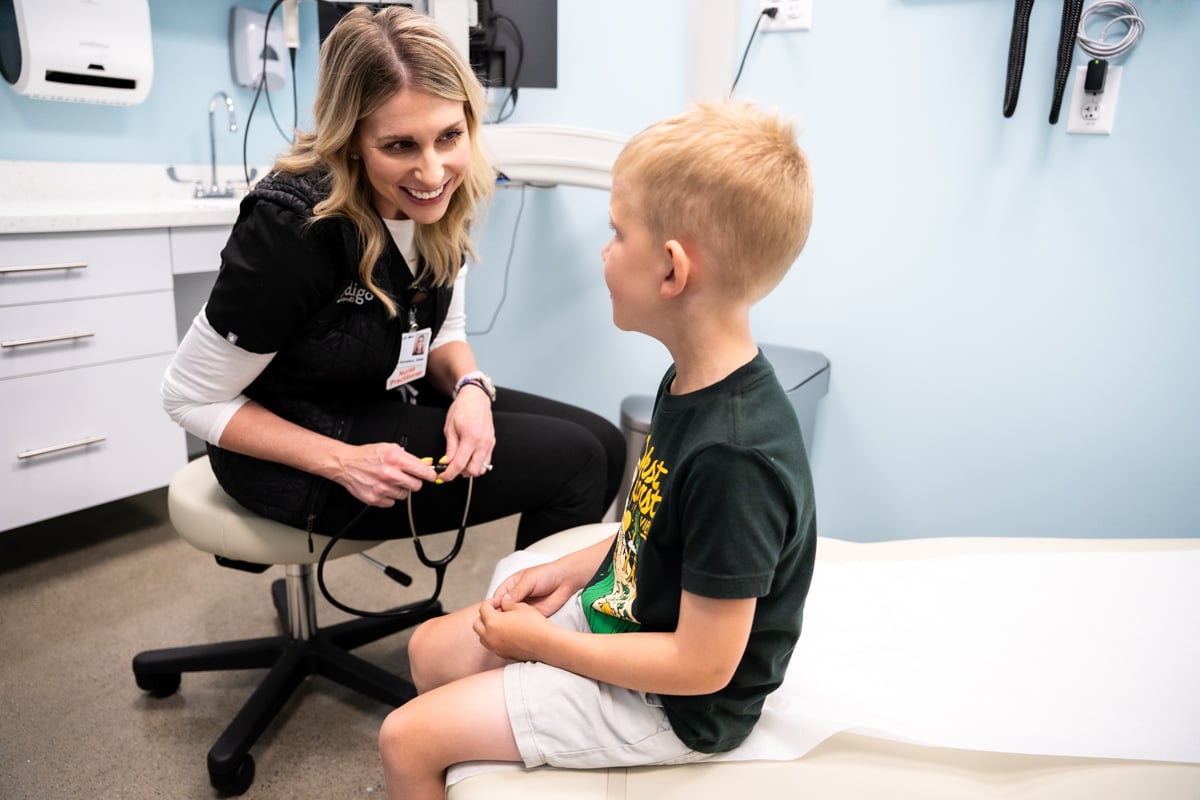If you’re a woman, it’s likely you’ve felt the burn. And the itch. And the…you get the idea.
According to the Office on Women’s Health (OWH), three out of four women in the U.S. will have a yeast infection at some point in their lives. And about half of women will have two or more infections. Yeast infections are the reason for around 1.4 million outpatient visits each year.
Whether you have an occasional yeast infection, or they happen often, there’s no reason to sit in a waiting room or hope for an opening on your doctor’s schedule. Thanks to Indigo Health Online Care, relief from uncomfortable yeast infection symptoms is as close as your phone, tablet or computer.
What causes yeast infections?
A vaginal yeast infection is a fungal infection that causes irritation, discharge and intense itching of the vagina and vulva. The condition is caused by an overgrowth of a fungus called candida, which normally exists on the skin and inside the body without causing much trouble.
A healthy vagina is all about balance. While some bacteria and yeast cells are normal, when things get out of whack, yeast cells multiply and can lead to infection.
Several factors can cause the unwelcome overgrowth of yeast, including:
- Hormonal changes. People are more likely to get a yeast infection during pregnancy, when taking hormonal contraception or around their period.
- Antibiotic medication can decrease good bacteria in the vagina.
- When uncontrolled, diabetes causes a spike in sugar in the urine, which can impact the vagina.
- A weakened immune system prevents the body from fighting infections and diseases.
- Activities or products that can adversely affect vaginal health, including wet clothing, feminine care products, improper diet and stress.
What are the symptoms of a yeast infection?
Most cases of vaginal yeast infection are mild, and some people have no symptoms at all. However, the Centers for Disease Control and Prevention (CDC) recommends your seek medical treatment if you have the following symptoms:
- Vaginal itching and soreness.
- Redness or swelling of the vagina and vulva.
- Pain during sex.
- Pain or a burning feeling when urinating.
- A thick, white vaginal discharge with the consistency of cottage cheese.
Is a yeast infection a sexually transmitted infection?
Yeast infections are not considered a sexually transmitted infections or disease. That said, yeast infections are more often seen in sexually active people. Intercourse can cause small breaks in the skin that allow yeast to grow.
It’s also possible to pass yeast infections to your partner during vaginal, oral or anal sex.
- If your partner is a man, the risk of infection is low. Only around 15 percent of men get an itchy rash on the penis if they have unprotected sex with a woman who has a yeast infection.
- If your partner is a woman, she may be at risk.
How can I get rid of my yeast infection?
Yeast infections are most often treated with an antifungal medication that is used to battle the overgrowth of yeast in the body. These treatments can be oral (taken by mouth) or topical (applied directly to the affected area).
There are also over-the-counter treatments available for yeast infections. However, it’s always a good idea to speak with a medical professional first to confirm you have a yeast infection and ensure you get the right treatment for your condition.
If your yeast infection symptoms come back frequently or don’t respond to typical treatments, there might be something else going on down there. Other medical conditions, including some sexually transmitted infections, skin reactions or allergies, lack of estrogen and certain skin conditions, can have similar symptoms.
How can I prevent yeast infections?
A few simple changes may help keep yeast infections at bay:
- Drop the douche. Douching can kill the bacteria that control fungus. And while the ads may push “fresh and clean,” the vagina does a splendid job of self-cleaning without the help of special products.
- Skip the fragrant vaginal sprays, tampons and pads. Scented products can upset the vagina’s natural pH, which helps regulate healthy bacteria. (Also, your vagina is not supposed to smell like a flower shop.) Opt for mild, unscented bath soap and laundry products.
- Strip yourself of wet clothing, such as swim suits and sweaty leggings, as soon as possible. Excessive moisture in your body’s most intimate area creates a breeding ground for yeast.
- Rethink your underwear game. Lace and Lycra may be pretty, but they trap heat and moisture. Cotton is what your vagina craves. It’s breathable, absorbent and the gentlest thing to put next to your skin.
- Cool your tub time. Avoid hot tubs and very hot baths.
- Tap into water-based sexual lubricants. Silicone or glycerin-based lube products have been shown to contribute to the overgrowth of yeast.
- Curb your sugar intake. There may be a connection between diets high in sugar and the occurrence of yeast infections. If you have diabetes, be sure your blood sugar is under control.
- Lower your stress level. Studies show that prolonged stress can cause cortisol levels to rise, which can also cause blood sugar to spike.
- Reach for the yogurt. Good gastrointestinal health is a key defense against yeast infections. But be sure to read the label first. Studies indicate that the best yogurt options for preventing infection have live probiotic cultures and no added sugars.
Indigo Health makes it easy to ditch the itch
When you have a yeast infection, Indigo Health Online Care offers the fast, friendly and reliable treatment you need, all from the comfort and convenience of home – or wherever you are.
Video visits with a board-certified Indigo provider are available 8 am to 8 pm every day. You’ll meet face-to-face for a consultation, then receive a diagnosis, care plan and prescription or refill, if needed.
Of course, we’re always happy to see you at one of our more than 35 Indigo neighborhood locations. Simply book an appointment online or walk in. We make getting care for minor illness and injuries as simple and convenient as possible. And if it makes sense for you to see a specialist, we’ll happily coordinate a referral.


